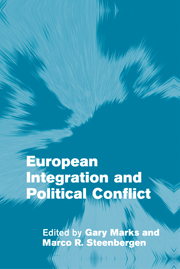Introduction: Models of political conflict in the European Union
Published online by Cambridge University Press: 22 September 2009
Summary
In the era following the Single European Act and the Maastricht Treaty, the European Union has been transformed into a multilevel polity in which European issues have become important not only for national governments, but also for citizens, political parties, interest groups, and social movements. How is conflict over European integration structured? This is the question that this book addresses.
The question of contestation over European integration has two related components. First, how do domestic and European political actors conceive the basic alternatives? Can debates over European integration, despite their complexity, be reduced to a relatively small number of dimensions? Does contestation over European integration resolve itself into a single underlying dimension, or does it involve two or more separate dimensions? Second, how is contestation over European integration related, if at all, to the issues that have characterized political life in Western Europe over the past century or more? In particular, how is contestation over European integration related to the left/right divide concerning the role of the state and equality vs. economic freedom?
These topics were first raised by neofunctionalists writing in the early days of European integration. Ernst Haas paid close attention to the domestic sources of opposition and support for European integration in his classic study, The Uniting of Europe, published in 1958. However, most scholars continued to view European integration as the result of foreign policies conducted by government elites acting on a “permissive consensus” (Lindberg and Scheingold 1970).
- Type
- Chapter
- Information
- European Integration and Political Conflict , pp. 1 - 10Publisher: Cambridge University PressPrint publication year: 2004
- 19
- Cited by



